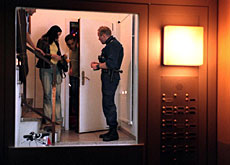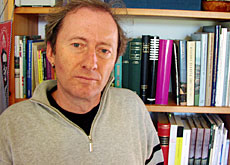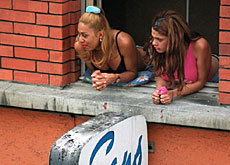Cantons step up fight against women trafficking

Authorities in a number of German-speaking cantons are stepping up the fight against women trafficking in Switzerland.
Cantons Zurich, Bern, Lucerne and Basel are reviewing their policies of expelling victims from the country before they have a chance to testify against traffickers in court.
According to support groups for immigrant women, most cases of trafficking go unpunished because many of the victims are immediately thrown out of the country when caught by police.
“These women aren’t considered victims, because they are in an unusual situation in our country,” said Marianne Schertenleib, of the Zurich-based Information Centre for Women from Africa, Asia, Latin America and Eastern Europe.
“When the police discover them, they begin expulsion procedures. These victims are treated like criminals.”
As a result, Schertenleib adds, the traffickers remain unpunished, because their victims are no longer available to testify against them.
Round table
Zurich was the first canton to make headway on changing its policies on dealing with trafficked women.
In August 2001, the Information Centre for Women from Africa, Asia, Latin America and Eastern Europe organised discussions with representatives of the justice system, police, aid agencies and equality campaigners in Zurich.
As a result of the meetings, the centre was allowed to take responsibility for any trafficked women caught by Zurich police, whereas previously these women had been expelled immediately from the country.
Cantons Bern, Lucerne and Basel have also begun organising similar meetings.
Meanwhile, the coordination service against the slave trade and the trafficking of migrants was set up in January, with the backing of the Federal Police Office.
Through the net
Although there are no exact figures on the scale of the problem, an estimated 1,500 to 3,000 trafficked women arrive in Switzerland each year, mostly working as prostitutes.
Between 120,000 and 500,000 women from eastern Europe are sold annually across western Europe. The trafficking of human beings has been illegal in Switzerland since 1960.
Although human trafficking is illegal, only five per cent of an estimated 3,000 cases per year result are successfully prosecuted, according to a 2001 report on the slave trade in Switzerland.
Marcel Bosonnet, a Zurich-based lawyer, says this raises some serious questions about the way Swiss authorities deal with the problem.
“We need, therefore, to ask ourselves two questions: are the statistics correct or is something not working in the judicial system?”
Ignorance
One of the possible explanations for this, adds Bosonnet, is the authorities’ ignorance in dealing with these cases.
The problem is compounded by the fact that there are no judges in Switzerland specialised in human trafficking, he says.
Furthermore, the idea that trafficking is mostly the work of organised crime is a myth, says Bosonnet.
“We’re talking about much smaller structures,” he explains, adding that many traffickers already know the women and their families. This allows them to put pressure on the victim if she tries to launch justice proceedings.
The 2001 Federal Report on the Slave Trade in Switzerland recommended new procedures for the treatment of trafficked persons caught by the authorities.
The recommendations included a three-month period of consultation, the right to remain in Switzerland during any penal procedure and, subsequently, an unlimited stay in the country on humanitarian grounds.
New procedures
Stephan Libiszewski, in charge of the coordination service against the trading of human beings and migrant traffic, says these suggestions have elicited mixed responses among parties involved in the round table discussions.
“But a consensus is possible on certain elements, notably not expelling trafficked persons immediately, offering a prolonged stay for people willing to act as witnesses in court and ensuring these people are not brought before the court themselves.”
Libiszewski says he’s confident the cantons will manage to improve the situation.
“We are at the start of a process of exchanges with the cantons,” he said. “It will take time, but we’re heading in the right direction.”
swissinfo, Ariane Gigon Bormann (Translation: Joanne Shields)
An estimated 1,500 to 3,000 trafficked women arrive in Switzerland each year.
Although human trafficking is illegal in Switzerland, only 5% of an estimated 3,000 cases per year result in punishment, according to a 2001 report on the slave trade in Switzerland.
In January, the coordination service against slavery and the trafficking of migrants was set up, with the backing of the Federal Police Office.
Cantons Zurich, Lucerne, Bern and Basel have set up discussions with the authorities to improve their policies on women trafficking.

In compliance with the JTI standards
More: SWI swissinfo.ch certified by the Journalism Trust Initiative


You can find an overview of ongoing debates with our journalists here . Please join us!
If you want to start a conversation about a topic raised in this article or want to report factual errors, email us at english@swissinfo.ch.